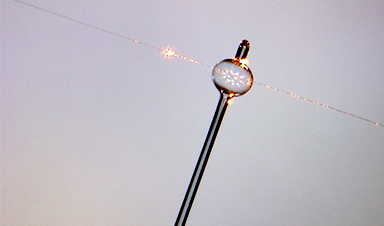Scientists at the Okinawa Institute of Science and Technology Graduate University (OIST) have developed technology that is in fact throwing light on certain smallest particles to detect their presence — and it is developed from tiny glass bubbles.
The technology is based on a unique physical phenomenon called the “whispering gallery,” described by physicist Lord Rayleigh (John William Strutt) in 1878 and named after an acoustic effect inside the dome of St Paul’s Cathedral in London. It was possible to clearly hear the whispers made at one side of the circular gallery at the opposite side. This is due to the travel of sound waves along the walls of the dome to the other side. This effect can be reproduced by light in a tiny glass sphere with a width just equal to the breadth a strand of hair, known as a Whispering Gallery Resonator (WGR).
Upon shining light into the sphere, it bounces around the inner surface again and again, forming an optical carousel. Photons that bounce along the inner surface of the tiny sphere can end up traveling for long distances, as long as 100 m at times. However, every time a photon gets bounced off the surface of the sphere, a small amount of light escapes. This leaking light forms a kind of aura around the sphere, called as an evanescent light field.
When nanoparticles enter the range of this field, its wavelength is distorted by them, thus effectively altering its color. Researchers can monitor these changes in color and use the WGRs as a sensor; earlier, different research teams used them to detect individual virus particles in solution, for instance. However, researchers at OIST’s Light-Matter Interactions Unit observed that enhancements to prior work can be made to develop even more sensitive designs. The research has been reported in the journal Optica.
Image Credit: OIST
News This Week
Drug-Coated Neural Implants Reduce Immune Rejection
Summary: A new study shows that coating neural prosthetic implants with the anti-inflammatory drug dexamethasone helps reduce the body’s immune response and scar tissue formation. This strategy enhances the long-term performance and stability of electrodes [...]
Scientists discover cancer-fighting bacteria that ‘soak up’ forever chemicals in the body
A family of healthy bacteria may help 'soak up' toxic forever chemicals in the body, warding off their cancerous effects. Forever chemicals, also known as PFAS (per- and polyfluoroalkyl substances), are toxic chemicals that [...]
Johns Hopkins Researchers Uncover a New Way To Kill Cancer Cells
A new study reveals that blocking ribosomal RNA production rewires cancer cell behavior and could help treat genetically unstable tumors. Researchers at the Johns Hopkins Kimmel Cancer Center and the Department of Radiation Oncology and Molecular [...]
AI matches doctors in mapping lung tumors for radiation therapy
In radiation therapy, precision can save lives. Oncologists must carefully map the size and location of a tumor before delivering high-dose radiation to destroy cancer cells while sparing healthy tissue. But this process, called [...]
Scientists Finally “See” Key Protein That Controls Inflammation
Researchers used advanced microscopy to uncover important protein structures. For the first time, two important protein structures in the human body are being visualized, thanks in part to cutting-edge technology at the University of [...]
AI tool detects 9 types of dementia from a single brain scan
Mayo Clinic researchers have developed a new artificial intelligence (AI) tool that helps clinicians identify brain activity patterns linked to nine types of dementia, including Alzheimer's disease, using a single, widely available scan—a transformative [...]
Is plastic packaging putting more than just food on your plate?
New research reveals that common food packaging and utensils can shed microscopic plastics into our food, prompting urgent calls for stricter testing and updated regulations to protect public health. Beyond microplastics: The analysis intentionally [...]
Aging Spreads Through the Bloodstream
Summary: New research reveals that aging isn’t just a local cellular process—it can spread throughout the body via the bloodstream. A redox-sensitive protein called ReHMGB1, secreted by senescent cells, was found to trigger aging features [...]














Leave A Comment